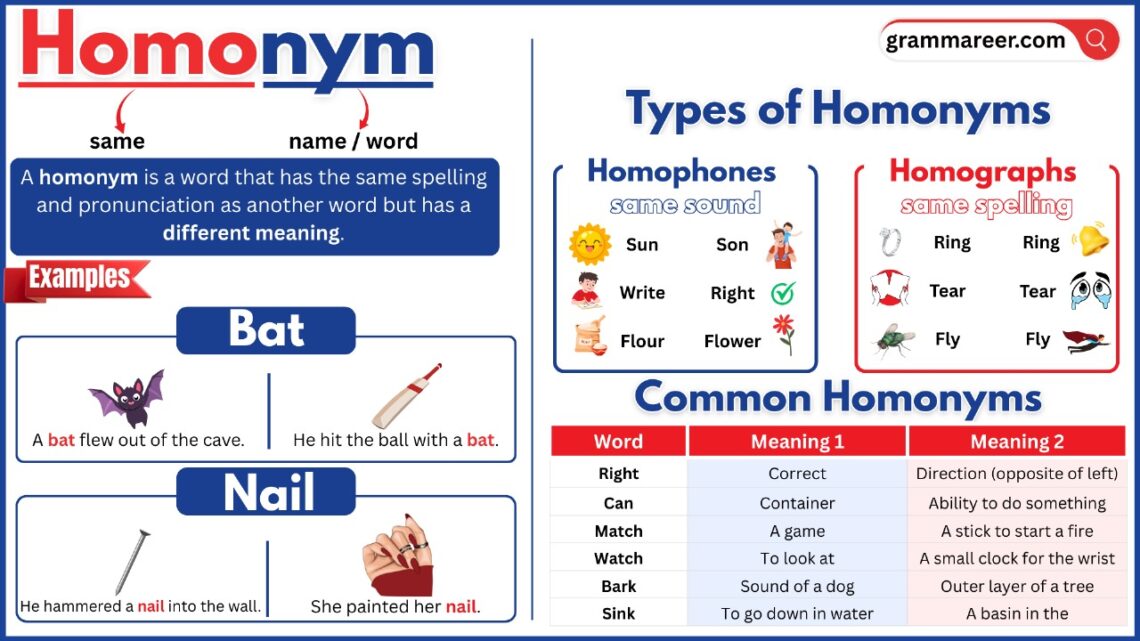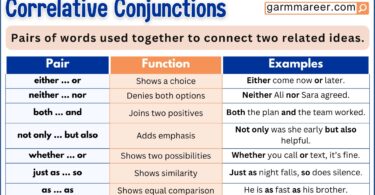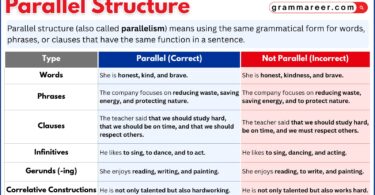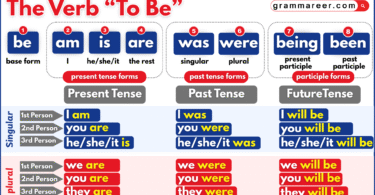Have you ever come across words that look or sound the same but actually mean different things? Those tricky words are called homonyms! Many learners mix them up with homophones and homographs, which can make English feel a little puzzling.
Don’t worry—To clear up the confusion between homonyms, homophones, and homographs, we’ll walk through common examples with meanings, parts of speech, and simple sentences. By the end, you’ll be able to spot and use them with confidence—without second-guessing yourself.
Table of Contents
What are Homonyms?
The word ‘homonym’ comes from Greek and literally means ‘same name.’ Pretty cool, right? In English, that simply means some words look or sound the same, but their meanings are totally different. For instance, think about the word bat—it can be the stick you play cricket with, or the flying animal that wakes up at night. Same word, two very different uses!
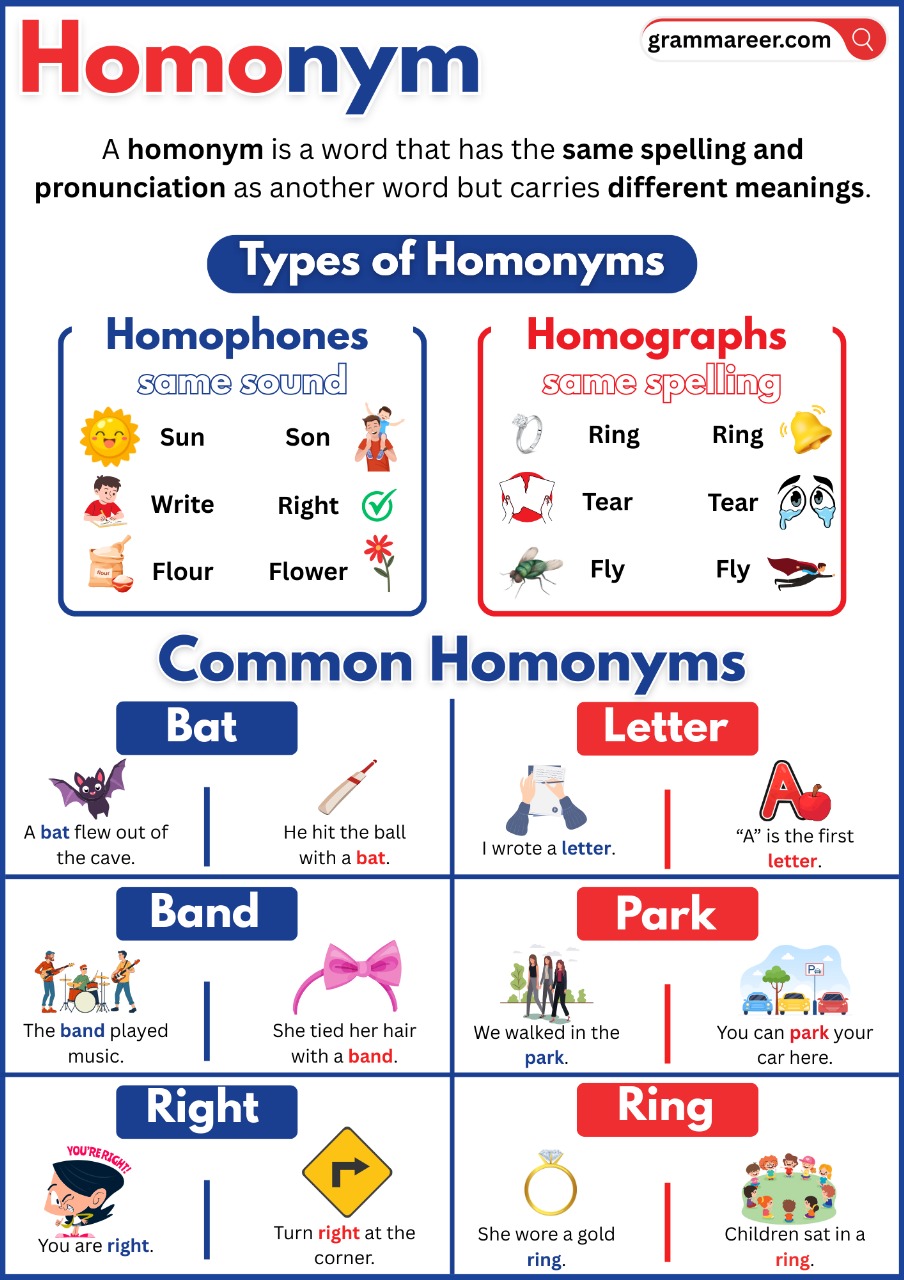
How Do We Use Homonyms in English?
Homonyms are words that sound the same or are spelled the same but have different meanings. We can find them in jokes, stories, conversations, brand names, and even classroom games. By understanding homonyms, you can enjoy wordplay and also avoid confusion when the same word is used in different ways.
Homonyms in Jokes:
Writers and comedians often use homonyms to make jokes because the double meanings create humor.
- Example: I used to be a banker but I lost interest.
(interest = money earned from savings, and interest = curiosity or concern) - Example: The duck said to the bartender, “Put it on my bill.”
(bill = a check to pay, and bill = the beak of a bird)
These jokes are funny because one word carries two different meanings. Such wordplay is also called a pun.
Homonyms in Literature and Poetry:
Authors and poets sometimes use homonyms to give depth and hidden meaning.
- Example: The wind will not let you win.
(wind = moving air, win = success; sound connection adds rhythm and meaning)
This makes writing playful, layered, and memorable.
Homonyms in Everyday Conversation:
We naturally use homonyms without noticing. Context tells us the meaning.
- She went to the bank to deposit money.
- (bank = financial institution)
- They sat on the bank of the river.
- (bank = land beside a river)
So, knowing homonyms helps us understand conversations better.
Homophones in Business Names:
Businesses often use homophones (same sound, different spelling) to create catchy names.
- Sole Man (shoe repair shop; sole = part of shoe, soul = person)
- Thai Tanic (Thai restaurant; play on “Titanic”)
- Knead a Break (bakery; knead = mix dough, need = require)
These names are easy to remember because of wordplay.
Homonyms in Learning and Fun Activities:
Teachers use homonyms in riddles, worksheets, or games to make learning interesting.
- Riddle: What has four wheels and flies? (Answer: a garbage truck—flies = insects, flies = moves)
- Puzzle games often challenge students to pick the right meaning from context.
Homophone vs. Homonym
- Homophones are words that sound the same but have different spellings or meanings.
Example: two, too, and to. They all sound alike, but each has a different meaning. - Homonyms are a bigger group. They can be words that sound the same OR are spelled the same, but mean different things.
Example: bat (the animal) and bat (used in cricket). Same spelling, different meanings.
So, all homophones are homonyms, but not all homonyms are homophones.
Homograph vs. Homonym
- Homographs are words that are spelled the same but have different meanings. Sometimes they are pronounced the same, sometimes not.
Example: lead (to guide) and lead (a metal). Same spelling, different meanings. - Homonyms, again, is the umbrella term. A homonym can be a homophone (same sound) or a homograph (same spelling).
Think like homonym as the “parent category,” while homophone and homograph are its “children.”
A Complete List of Homonyms with Their Uses and Examples
Below are two tables of homonyms. The first table shows words with the same spelling and/or pronunciation, and the second table shows words with different spellings but the same pronunciation.
Table 1: Homonyms with the Same Spelling and/or Pronunciation
| Homonym | Part of Speech | Meaning | Sentence Example |
| Bark | Noun | The outer covering of a tree | The bark of this tree is very rough. |
| Bark | Verb | The sharp sound made by a dog | I heard the dog bark loudly at night. |
| Well | Noun | A deep hole from which water is drawn | Villagers get their water from the old well. |
| Well | Adverb | In a good or satisfactory manner | He speaks English very well. |
| Can | Verb | To be able to do something | I can solve this puzzle easily. |
| Can | Noun | A metal container | She bought a can of juice from the store. |
| Spring | Noun | A season of the year | Flowers bloom beautifully in spring. |
| Spring | Verb | To jump or leap suddenly | The cat will spring onto the table. |
| Bat | Noun | A wooden stick used in sports | He hit the ball with his bat. |
| Bat | Noun | A flying mammal | A bat was hanging upside down in the cave. |
Table 2: Homonyms with Different Spellings but the Same Pronunciation
| Homonym | Part of Speech | Meaning | Sentence Example |
| Flour / Flower | Noun | Powder used for making food | She used flour to bake bread. |
| Flour / Flower | Noun | The colorful part of a plant | A red flower grew in the garden. |
| Sea / See | Noun | A large body of salt water | The ship sailed across the sea. |
| Sea / See | Verb | To look or notice | I can see the stars clearly tonight. |
| Sun / Son | Noun | The star that gives us light and heat | The sun rises in the east. |
| Sun / Son | Noun | A male child | She has one son and two daughters. |
| Whole / Hole | Adjective | Complete or entire | He ate the whole pizza by himself. |
| Whole / Hole | Noun | An empty space or opening | There’s a hole in my shoe. |
| Knight / Night | Noun | A soldier in armor during medieval times | The knight fought bravely for his king. |
| Knight / Night | Noun | The dark part of a day | Stars twinkle at night. |
Why Homonyms Matter?
Homonyms are important because they can easily confuse us when we read or write. Words that sound alike or look alike, such as peace and piece, often lead to simple mistakes. Knowing that such words exist helps you slow down and check before using them.
At the same time, homonyms are not just about errors—they can also make language creative and fun. Writers and advertisers often use them to create puns or catchy names. For example, a bakery called Flour Power uses a play on words to grab attention and be memorable.
So, the next time you come across a tricky word, take a moment to think if it has a “twin” with a different meaning. Choosing the right one will improve your writing, and if you enjoy wordplay, homonyms can even make your sentences stand out.
You May Also Like
What are Prepositional Phrases?
Em Dash (—) Definition and Examples
Punctuation and Capitalization in English

